Search

News & Events
Delivering smart drugs into cellsThe Drug Discovery Unit has been finding ways for smart drugs to penetrate deep into cells and attacking their disease targets while causing fewer side effects
Research
Bacillus Cereus Bacteremia and Multiple Brain Abscesses During Acute Lymphoblastic Leukemia Induction TherapyBacillus cereus can cause serious infections in immunosuppressed patients. This population may be susceptible to B. cereus pneumonia, bacteremia, cellulitis,...
Research
Genetic polymorphisms and childhood acute lymphoblastic leukemia: GWAS of the ESCALE study (SFCE)Acute lymphoblastic leukemia (ALL) accounts for approximately 80% of the acute leukemia (AL) overall cases per year in France. We report the results of a...
Research
The Australian and New Zealand Children's Haematology/Oncology Group Biobanking NetworkThe ANZCHOG-BN is a new biobank network in Australasia that was developed to improve and streamline access to high-quality pediatric and AYA cancer biospecimens
Research
Tissue-resident memory CD8+ T cells promote melanoma–immune equilibrium in skinOur results show that TRM cells have a fundamental role in the surveillance of subclinical melanomas in the skin by maintaining cancer-immune equilibrium
Research
Partial trisomy 21 contributes to T-cell malignancies induced by JAK3-activating mutations in murine modelsThis JAK3A572V knockin model is a relevant new tool for testing the efficacy of JAK inhibitors in JAK3-related hematopoietic malignancies
Research
Immunogenicity and safety of single-dose, 13-valent pneumococcal conjugate vaccine in pediatric and adolescent oncology patientsAll children who are receiving therapy for cancer should receive a single dose of PCV13 as soon as possible after diagnosis, regardless of prior PCV exposure.
Research
Heterogeneity in mechanisms of emergent resistance in pediatric T-cell acute lymphoblastic leukemiaBiological changes associated with T-ALL relapse and resistance are stochastic and highly individual
Research
Home pesticide exposures and risk of childhood leukemia: Findings from the childhood leukemia international consortiumIn this investigation, the authors found an association between home pesticide exposure before birth and during a child's early years and acute lymphoblastic...
Research
Home paint exposures and risk of childhood acute lymphoblastic leukemia: findings from the Childhood Leukemia International ConsortiumThis paper demonstrated that home paint exposure shortly before conception, during pregnancy, and/or after birth appeared to increase the risk of childhood ALL.
